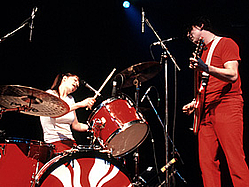In 2002, when I was working as a lowly researcher at Spin magazine, the White Stripes — a band, who, along with fellow revivalists the Strokes and the Hives, were in the midst of "saving rock and roll" (to borrow a phrase thrown about liberally at the time) — played a free show in New York's Union Square. It was, and still is, one of the five greatest rock gigs I've ever seen, and not just because it meant I got to skip out on work to go see it.
Although it lasted only an hour, it was my first indoctrination into the way of the White Stripes: Do it fast, do it cheap, do it loud and don't stop doing it even when the man pulls the plug, which in fact happened. After organizers turned off the sound, Jack and Meg tore through an unplugged cover of the standard "Boll Weevil Blues." I would see them again in subsequent years — a thunderous '03 performance at Roseland Ballroom, months after they conquered the world with Elephant and appropriately used footlights to cast mile-high shadows against the backdrop, a roaring set in 2007 at Bonnaroo, where they unified the masses with Icky Thump's skronk — but nothing stuck with me quite like that first show.
Check out photos of the White Stripes through the years.
Maybe it was because I was still young and impressionable, at least impressionable enough to truly believe that a duo from Detroit could change the world with nothing more than a guitar and a drumkit, or maybe it was because the Stripes were the closest thing I'd seen to a genuinely revelatory rock band. There was a mythology to them — the red-and-white getups, the whole "brother/sister" dynamic, the fact that Jack White seemed like a genuine sharecropper's son — not to mention a blue-collar power that recalled the punch of fellow Motor City maniacs the MC5 or nearby neighbors the Stooges. They didn't care about fashion, they didn't care about pristine studio sound, they just cared about playing music in the loudest, most primitive way possible. And that's where the magic came from.
The White Stripes were, in short, everything I could ever want in a rock band. And on Wednesday (February 2), when they announced they were ending their 13-year run, I was genuinely saddened. And not just because I would never get to see them live one last time, or listen to another one of their records front to back or, even, get the chance to interview them again (something I only had the opportunity to do once), but because, in some small way, it meant that a little part of my youth had died too. And it was never coming back.
Because, though they were a preternaturally old band (their entire output recalls nothing recorded over the past 30-plus years), the Stripes were also incredibly young. Jack White, ever the aged bluesman, was also remarkably childlike; he delighted in nothing more than playing loud, tweaking the media and doing things his way. And it would be easy to say that Meg White played the drums like a child, but I prefer to look at the unbridled joy with which she hammered away at the kit. It was as if she had never known better. And the band was better because of it.
But the thing that made them eternally young (at least in my eyes) was their unyielding sense of purpose. There truly was no obstacle they could not overcome, no challenge too great, because the White Stripes believed in themselves. It's what drove them to start a band in the first place — so what if our drummer can't drum, we'll figure it out ourselves — and record in the most arcane ways imaginable. It's what drove them to play a show in every province and territory in Canada: They simply knew they could do it.
There's a name for that childlike confidence and people call it DIY. It's how we got bands like the Ramones and Minutemen, how hip-hop grew from rec rooms in the South Bronx and, really, it's the reason anyone should ever decide to pick up an instrument: I can do this. We can do this. Together, we can change the world.
It's the engine that drove the best bands in history and, yes, the White Stripes are definitely one of those. I'd argue that, of all their contemporaries, they're the only group that we'll still be talking about in 20 years' time. Their place in rock history is secure. And though I was saddened to learn of their demise, there was something in their farewell message that gave me hope. It's how they decided to sign off, with a statement that, if anything, recalled the very spirit that made them start the band way back in 1997. Here's what they wrote:
"The White Stripes do not belong to Meg and Jack anymore. The White Stripes belong to you now and you can do with it whatever you want. The beauty of art and music is that it can last forever if people want it to. Thank you for sharing this experience. Your involvement will never be lost on us and we are truly grateful."
That's about as DIY. as you can get. The White Stripes now truly belong to us. And if that's not a fitting way to end this piece, then I don't know what is. So farewell, White Stripes, you lightning rods, you touchstones, you eternal children. You were everything that rock and roll should be, and you will be missed.
Share your thoughts about the White Stripes disbanding in the comments.










